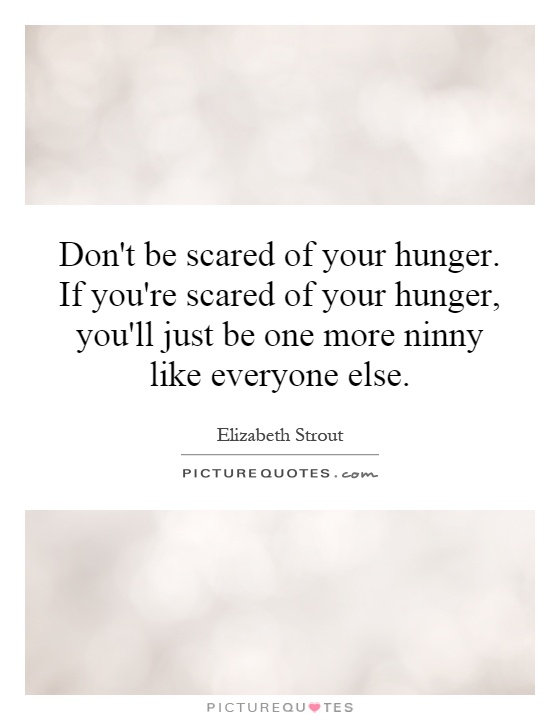Don't be scared of your hunger. If you're scared of your hunger, you'll just be one more ninny like everyone else

Don't be scared of your hunger. If you're scared of your hunger, you'll just be one more ninny like everyone else
Elizabeth Strout is a renowned American author known for her insightful and emotionally resonant novels that delve into the complexities of human relationships and emotions. In her works, Strout often explores themes of loneliness, longing, and the search for connection. One of the recurring motifs in her writing is the idea of embracing one's desires and vulnerabilities, rather than shying away from them out of fear or shame.In the quote, "Don't be scared of your hunger. If you're scared of your hunger, you'll just be one more ninny like everyone else," Strout encourages readers to confront their innermost desires and needs without hesitation or reservation. She suggests that denying or suppressing one's hunger, whether it be physical, emotional, or spiritual, only serves to diminish one's authenticity and individuality. By succumbing to fear and conforming to societal expectations, one risks losing touch with their true self and becoming just another face in the crowd.
This sentiment is echoed in many of Strout's novels, where characters grapple with their own insecurities, desires, and fears. In "Olive Kitteridge," for example, the titular character struggles with feelings of loneliness and isolation, but ultimately finds solace in embracing her flaws and imperfections. Similarly, in "My Name is Lucy Barton," the protagonist confronts her painful past and learns to accept her hunger for love and connection, despite the risks involved.
Through her writing, Strout challenges readers to confront their own vulnerabilities and desires, and to embrace them as essential aspects of their humanity. By acknowledging and accepting their hunger, whether it be for love, acceptance, or fulfillment, individuals can cultivate a deeper sense of self-awareness and authenticity. In doing so, they can break free from the constraints of societal norms and expectations, and forge a path towards greater personal fulfillment and emotional growth.












 Friendship Quotes
Friendship Quotes Love Quotes
Love Quotes Life Quotes
Life Quotes Funny Quotes
Funny Quotes Motivational Quotes
Motivational Quotes Inspirational Quotes
Inspirational Quotes